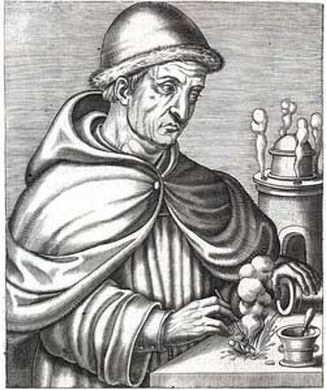 This rounds off a little project of mine to investigate Roger Bacon, the thirteenth century Franciscan friar who wrote about the possibilities of scientific inquiry. His work was suppressed in his lifetime, and he spent most of it imprisoned by his religious order, and forced to bribe his keepers to smuggle in writing paper. His large (for the time) collection of books and experimental apparatus disappeared in the turmoil of war. Since then, his reputation has suffered extremes of interpretation. Renaissance popular culture saw him as an occultist and magician. It was claimed, among other absurdities, that he possessed a talking head of brass. His unrelated namesake, Francis Bacon, expropriated many of his ideas and received the credit for them. Some nineteenth century historians praised him, struck by his prophetic assertions that inquiry into nature would make it possible to observe the stars and very small things with properly arranged lenses, that we would some day create flying machines and “cars” that move without the help of animals, that we would be able to record and replay sounds, and for his precise chemical formula for gunpowder. But twentieth century historians tended to downgrade him to a “pre-scientific” curiosity.
This rounds off a little project of mine to investigate Roger Bacon, the thirteenth century Franciscan friar who wrote about the possibilities of scientific inquiry. His work was suppressed in his lifetime, and he spent most of it imprisoned by his religious order, and forced to bribe his keepers to smuggle in writing paper. His large (for the time) collection of books and experimental apparatus disappeared in the turmoil of war. Since then, his reputation has suffered extremes of interpretation. Renaissance popular culture saw him as an occultist and magician. It was claimed, among other absurdities, that he possessed a talking head of brass. His unrelated namesake, Francis Bacon, expropriated many of his ideas and received the credit for them. Some nineteenth century historians praised him, struck by his prophetic assertions that inquiry into nature would make it possible to observe the stars and very small things with properly arranged lenses, that we would some day create flying machines and “cars” that move without the help of animals, that we would be able to record and replay sounds, and for his precise chemical formula for gunpowder. But twentieth century historians tended to downgrade him to a “pre-scientific” curiosity.
I can’t help but think that this is the result of the absence of easily available translations of his work, compared to the ready availability of Francis Bacon’s Advancement of Learning and Novum Organum. There was nothing crude of occult about Roger’s notions of a natural science based on observation and experiment. In fact, he firmly rejected all supernatural interpretations, and presented his ideas with greater consistency and clarity than Francis did. He also grasped the importance of mathematics for quantifying data, which Francis failed to do. Roger Bacon was just not listened to. His work fell on deaf ears because society was not sufficiently advanced to make use of it. Francis Bacon presented a watered-down version of it, at a time when Europe was ready to listen.
My impression, after reading some of Roger Bacon’s work, and what biographical material I could get hold of, is that he was one of the major intellects of his time, perhaps smarter and more astute than his contemporary rival, Thomas Aquinas. He was inspired, like Aquinas, by the Greeks and the brilliant Muslim philosophers and naturalists. But, unlike Aquinas, he was far less inclined to jam these sources into a preconceived Christian orthodoxy. He complained that Aquinas never proved anything that he had not decided he was going to prove before he started. That was the difference between them, and the difference between a theologian and a scientist, in a nutshell.
0 Comments.